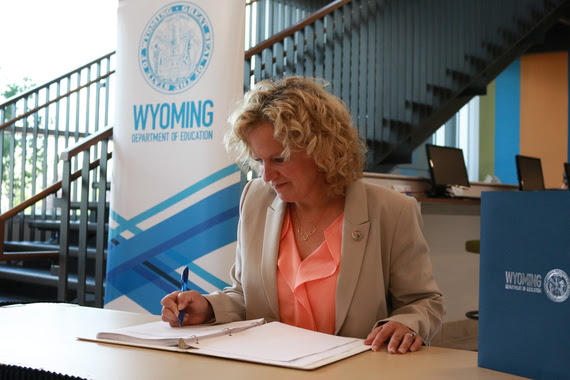
U.S. Department of Education Approves ESSA Vermont State Plan
September 1, 2017

September 1, 2017

U.S. Education Secretary Betsy DeVos has approved Vermont’s and Maine’s state accountability plans under the Every Student Succeeds Act, the Education Department announced Thursday.
The plans detail how the states will comply with the federal law which goes into effect this fall. The Education Department cited several components of the states’ plans in announcing the approvals.
In Vermont’s case, that includes the inclusion of physical fitness in its accountability system, as well as tracking the percentage of high school students who go on to college, the workforce, military, or trade school 16 months after graduation…
Read the full article here. May require an Education Week subscription.

U.S. Secretary of Education Betsy DeVos Friday afternoon approved North Dakota’s accountability plan under the Every Student Succeeds Act.
In a press release, the department noted the state’s extensive stakeholder-engagement process and the way its accountability system incorporates school climate and student engagement.
Education Week visited North Dakota earlier this summer for a statewide ESSA summit where state education department representatives explained to a conference room full of district teacher leaders, principals, and district superintendents details of the plan that had just been submitted…
Read the full story here. May require an Education Week subscription.

This keynote address provided a high-level overview of major reauthorizations since the passage of the Elementary and Secondary Education Act. It focused on the key priorities of the new Every Student Succeeds Act (ESSA), looking particularly at accountability systems, school improvement, teacher and leader quality, data collection and reporting, educational technology, and regulation. Maureen Wentworth, Director of the Education Data and Information Systems of the Council of Chief State School Officers, gave this address at the 2016 Pennsylvania Department of Education Data Summit.
The content of these videos does not necessarily reflect the views or policies of the Institute of Education Sciences or the U.S. Department of Education, nor does mention of trade names, commercial products, or organizations imply endorsement by the U.S. Government.

With the flurry of news about states’ plans for the Every Student Succeeds Act, are you confused about where things actually stand? We’re here to help end your confusion.
Over at Education Week’s detailed state ESSA plan tracker, we’ve just added a new map that shows the status of each state’s plan. There are three categories: one for states that haven’t submitted their plans to the U.S. Department of Education yet, one for states that have gotten feedback on their plans from the Education Department, and one for states whose plans have gotten final approval from the feds…
Read the full article here. May require an Education Week subscription.

BALTIMORE —
The Maryland state Board of Education is at odds over how it wants to grade schools using a five-star rating system.
For now, Maryland is sticking with a five-star rating system to determine which schools will get passing grades. The Board of Education passed the education plan Tuesday with a 7-2 vote.
This is all part of new federal requirements for the Every Student Succeeds Act. The state plan still needs approval from the U.S. Department of Education.
Discussion Tuesday lasted nearly two hours as state Board of Education members try to come up with a final school accountability plan that spells out how Maryland schools will be graded in the future.
“We need to empower parents with clarity of information so they can say, ‘Why is my school one star? What are you doing to change it?’ Or, ‘Oh my goodness, my school is a five star,'” said Andrew Smarick, president of the Board of Education.
For now, the star-rating system will stay in place, but with some minor adjustments. The state will now add arrows next to the stars to help explain school-by-school progress.
“The more we can get up front in terms of information, the better we can serve parents,” said David Steiner, a member of the Board of Education.
The latest revisions to the ESSA draft plan are getting a nod from the state’s teachers union when it comes to overall school rankings.
“We are not just using testing to provide resources and support to schools, we are now going to look at all of those things; all of the indicators and supports that schools need to really address them instead of just a test,” said Cheryl Bost, president of the Maryland State Education Association.
But some Board of Education members said the recent changes made to the grading system may not go far enough.
“We cannot create a system in which we are misleading people that their kid is going to a great school if it’s not or if they’re going to a bad school if it is,” said Chester Finn, a member of the Board of Education.
The Board of Education must submit its final education plan to the federal government by Sept. 18.

The Every Student Succeeds Act (ESSA) replaced No Child Left Behind (NCLB) on December 10, 2015. It is the reauthorization of the Elementary and Secondary Education Act (ESEA). ESSA will be fully operational in school year 2017-18.
NEW! The ESSA Consolidated Plan Summary is now available!
لعَرَبِيَّة (Arabic) | 한국어 (Korean) | русский (Russian) | Español (Spanish) | Wikang Tagalog (Tagalog) | Українська (Ukrainian) | Tiếng Việt (Vietnamese)
Read Superintendent Reykdal’s letter and the Revised ESSA Consolidated Plan.
You can learn about What’s New in ESSA? with our flyers, catch up on the latest on our Medium site, or view other resources like summaries and translations.
You can read about the plan and drafting process on our Consolidated Plan page. Dig deeper into how the plan will affect districts on our District Resources page.
OSPI is holding five webinars throughout August to discuss the plan and changes between the first draft and this draft.
Take a minute to let us know what you think of the plan! You can provide feedback through September 5, and your feedback will be considered as OSPI completes the plan for submission to the U.S. Department of Education.
Share this page on Facebook, Twitter, through email, wherever! We want to hear from as many Washingtonians as possible about the changes coming to our schools!
Gayle Pauley, gayle.pauley@k12.wa.us or 360-725-6170
Carrie Hert, carrie.hert@k12.wa.us or 360-725-6170
Translation Services
Please let us know if you need an interpreter—at no cost to you. We can answer your questions in your language!


[/media-credit] State Superintendent Jillian Balow signs Wyoming’s ESSA state plan at Laramie County Community College.
Superintendent of Public Instruction Jillian Balow signed off on Wyoming’s Every Student Succeeds Act Plan, ESSA, Thursday, August 17. It will now be submitted to the U.S. Department of Education for approval.
The federal education policy fully replaces No Child Left Behind, giving states more authority to define educational goals for students.
The U.S. Department of Education still requires every state to submit a plan detailing how it would provide an adequate and equitable education.
Balow made remarks at a public signing of the plan. She said public input was essential to the formation of Wyoming’s ESSA plan.
“The law, the ESSA law, states over and over again that our state plan must be stakeholder driven,” said Balow. “And it must include meaningful and continuous consultation with a diverse set of stakeholders.”
Balow said Wyoming’s Department of Education, or WDE, held 14 public meetings, got over 500 responses to a survey and received over 100 public comments on the plan.
She said the WDE heard: “That we can and must do better for all of our students. What we heard is that one test cannot and should not define student success.”
Balow said this plan moves away from the more standardized approach which characterized No Child Left Behind, and is rooted in what’s best for Wyoming — like including more opportunities for career and technical training.

MICHIGAN — The Michigan Department of Education has re-submitted the state’s plan to the U.S. Department of Education (USED) for the federal Every Student Succeeds Act, responding to USED’s official feedback received two weeks ago.
ESSA is the new federal law that replaced the previous No Child Left Behind Act. Every state is to develop a plan that it will use to improve educational outcomes for children and hold schools accountable and transparent for that success.
The re-submitted plan includes requested technical detail and clarifications to the first submitted plan, as well as better defined information on a school accountability system.
“When the plan first was submitted, it contained three options for school accountability,” State Superintendent Brian Whiston said. “After the legislature adjourned for the summer, it became clear that we would be going forward with a Transparency Dashboard.
“Our staff have been working diligently to fully develop that dashboard and an index from which to identify the state’s most struggling schools,” he said. “Identifying those struggling schools is required by both federal and state law, along with the supports those schools will be receiving.”
Michigan’s ESSA plan is a thoughtful and dynamic plan to keep Michigan schools moving forward. It builds upon the goals and strategies outlined in the Top 10 in 10 initiative and the Governor’s 21st Century Education Commission.”
Due to the short turnaround time USED gave the state to submit its updated plan, education stakeholders were not directly involved in this revision, although it was informed by their previous contributions.
“We will be bringing back the education stakeholders who helped develop the original plan and update them on the re-submitted details,” Whiston said. “The decisions made on the re-submitted plan were based on their input throughout the original process.”
The concept of the federal law is to give schools more flexibility in how they meet the comprehensive needs of their students with tailored strategies for student and educator success, and less focus on compliance to federal requirements.
At its core, Michigan’s ESSA plan centers on Michigan’s children – their opportunity to learn; to access excellent educators and meaningful supports; and to successfully transition to college, career, and life.
The Michigan ESSA plan is the product of nearly a year of work, engaging thousands of stakeholders through work groups, community meetings, focus groups, online surveys, webinars, and general input from the public.
It was developed through the inclusion and consultation with the Governor; State Board of Education; state legislature; and representatives from local school districts, schools, intermediate school districts, Michigan’s 12 federally-recognized tribal education departments, civil rights groups, education organizations, teachers, parents, students, business leaders, community members, and foundations.
“I said from the beginning of this work that we are going to put forward a plan that is best for the students in Michigan,” Whiston said. “This is how we move forward, and I want to thank all of the passionate people who provided input and helped inform this plan. Let’s all work together now to put the plan into action.”
As work moves forward toward implementation and as the conversation continues, particularly around assessment and accountability, the Michigan Department of Education (MDE) will leave the MDE-ESSA@michigan.gov email account open for any additional feedback that anyone may want to submit, based on the re-submitted plan and will consider that feedback as the state works with USED on plan approval and throughout implementation of the plan.
To read Michigan’s ESSA Plan (as it has been updated), an Overview of the plan, and historical documents developed during various iterations of the plan, go to www.michigan.gov/ESSA.

On Tuesday, the Minnesota Department of Education (MDE) kicked off their Every Student Succeeds Act (ESSA) public comment regional meetings at the Wilder Foundation in Saint Paul. Over 60 individuals gathered to hear Commissioner Cassellius and Michael Diedrich, MDE’s Elementary and Secondary Education Act Policy Specialist, share the state’s ESSA accountability plan, answer questions, and receive public input.
Education Evolving has extensively covered the state’s ESSA accountability plan development process, as well as reported in detail on several components of the plan. This blog post will, however, focus on a couple of the changes that Commissioner Cassellius indicated MDE has made since the July 20th ESSA hearing at the Legislature, as well as some concerns that have been raised by the public.
Commissioner Cassellius indicated that one of the changes MDE has made is that they will use achievement rates instead of a proficiency index rate for the academic achievement indicator.
In the initial version of the plan, which used a proficiency index rate, schools were awarded 1.0 point for every student that either “meets standards” or “exceeds standards” and 0.5 points for every student that “partially meets standards” on the Minnesota Comprehensive Assessments (MCAs). However, in the updated plan, schools will not be awarded any points for students who “partially meets standards.” Rather, schools will only be awarded 1.0 points for every student who either “meets standards” or “exceeds standards.”
According to Commissioner Cassellius, MDE decided to make this change because legislators and stakeholder groups had indicated that the previous system was “confusing.” However, public commentary has indicated that there is some dissatisfaction with that decision.
The draft state accountability plan, which MDE released on July 17th, indicated that students who opted out of the state’s MCAs would “functionally count the same as students at the ‘does not meet standards’ achievement level.” However, the state’s updated plan indicates that “Students who do not participate in the test will be identified in state records and in communications with families as not participating; they will not be described as failing to meet standards.”
With that said, students who opt-out or do not participate in the MCAs will still be included in the denominator used to calculate the school’s academic achievement rate and they will not be awarded any points.
So far, much of the public feedback submitted on the plan has lauded MDE’s focus on equity, inclusion of 7-year high school graduation rates, and the creation of a manual that standardizes the identification, entrance, and exit decisions for English language learners. However, some concerns remain.
One concern is the exclusion of some form of a summative rating. A ninth grade teacher at Hiawatha Collegiate High School urged MDE to include a summative rating because the “citizens of Minnesota deserve a clear, direct, and transparent system to see where we are and how we will grow.”
Another concern is the use of a funnel approach to identify schools for comprehensive support. A second grade teacher from Global Academy indicated his support for a weighted point system and provided an example as explanation, “Under the funnel system, a school could be in the 1st percentile of academic achievement, advance to the next level of the funnel, happen to be in the 26th percentile for academic progress and be deemed not in need of comprehensive support.”
MDE has to submit the state accountability plan to US Department of Education (USDE) on September 18, 2017. However, before MDE submits the plan they must also do the following:
MDE will also host a series of additional public commentary meetings from 6:00-7:30 PM at the following locations:
These meetings are open to the public and you can register to attend one of them here. If you are unable to attend one of the public commentary meetings, the state’s current accountability plan is also published to the MDE website and is available for public comment until August 31st.
Education Evolving will continue to follow and report on the development of Minnesota’s ESSA state accountability plan.